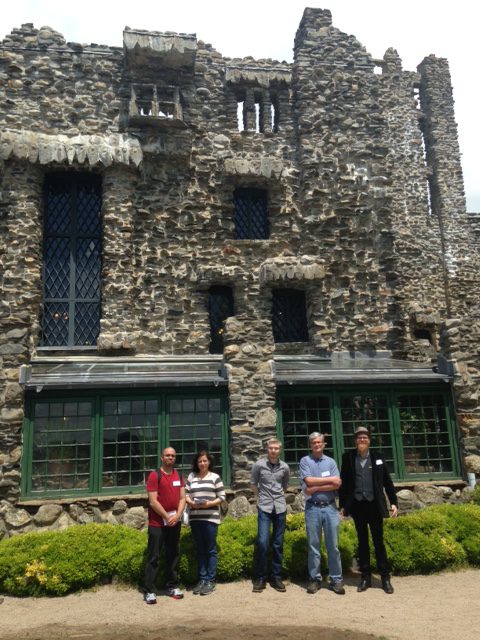Did you know that Sherlock Holmes, that is the original Homes of the novels and stories, did not wear a deer-stalker, did not smoke the distinctive curved pipe we associate with him, and did not ever say “Elementary, my dear Watson”? Well, you do now. Those famous attributes of the world’s most famous detective were in fact invented by William Gillette, the actor and playwright who adapted Holmes for the stage in 1899, and played him over 1,300 times in the next 30 years. I learned this yesterday while leading a writers’ retreat at the eccentric castle that Gillette built to be his home on the verge of the Connecticut River. I’d never heard of Gillette, but in his day he had rock-star levels of fame, and he certainly seemed to throw plenty of money into this castle. It’s a fascinating place, Gothic on the outside but warmer on the inside, and with many touches that come from Gillette’s skill as a theatre designer and his amateur interest in engineering. I will remember the liquor cabinet for a long time: Gillette would serve drinks from it, secretly lock it via a hidden mechanism, then observe his guests via a disguised mirror as they struggled to get a second drink out of it. One of the bemused guests was Albert Einstein, who had a house nearby, and who never figured out the answer to the Adventure of the Locked Liquor Cabinet.
As you can imagine, the Castle made a very rich place for a writers’ retreat. The architecture, the theatrical elements of the building, the history of Gillette, and the location above Connecticut river were a gift for helping the writers find inspiration. There were 13 writers in all, and they were by far the most diverse group I’ve had the good fortune to teach, ranging in genre from biography to horror-suspense to stage plays, in age from high school to (I’m guessing) fairly far into retirement, and in experience from MFA holders to a self-described “non-writer” doing her first ever writing event. I sent them off to explore the castle for a couple of hours, looking for interesting details and making notes, then dreaming up some characters, settings, plots, poems, and themes from what they’d observed. Back in the Visitor Center, I suggested some ways to add creative distance and power to what they had seen, and then use the power of collision and chance to give new dimensions to their first ideas. It was, as one writer noted, compelling to see how “we agreed on general ideas of the castle yet branched our own way in writing.”
The Retreat was organized by Kandie Karl of the East Haddam Stage Company and Wendy Vincent of E.P.I.C. Publishing, and I gather that they are keen to run other writing events at the Castle in the future. If you’re interested, I recommend connecting with Kandie on Facebook or by email. It’s a great place. Kandie also has a summer season of theatre taking place in the grounds of the Castle: see the East Haddam Stage Company website for details. And if you’re a writer with a book, check out Wendy’s self-publishing service, that guides authors through the difficult process of self-publishing and self-marketing.
And the last word goes to one of the writers: “A very good experience for anyone who might want to participate.” Thank you!

